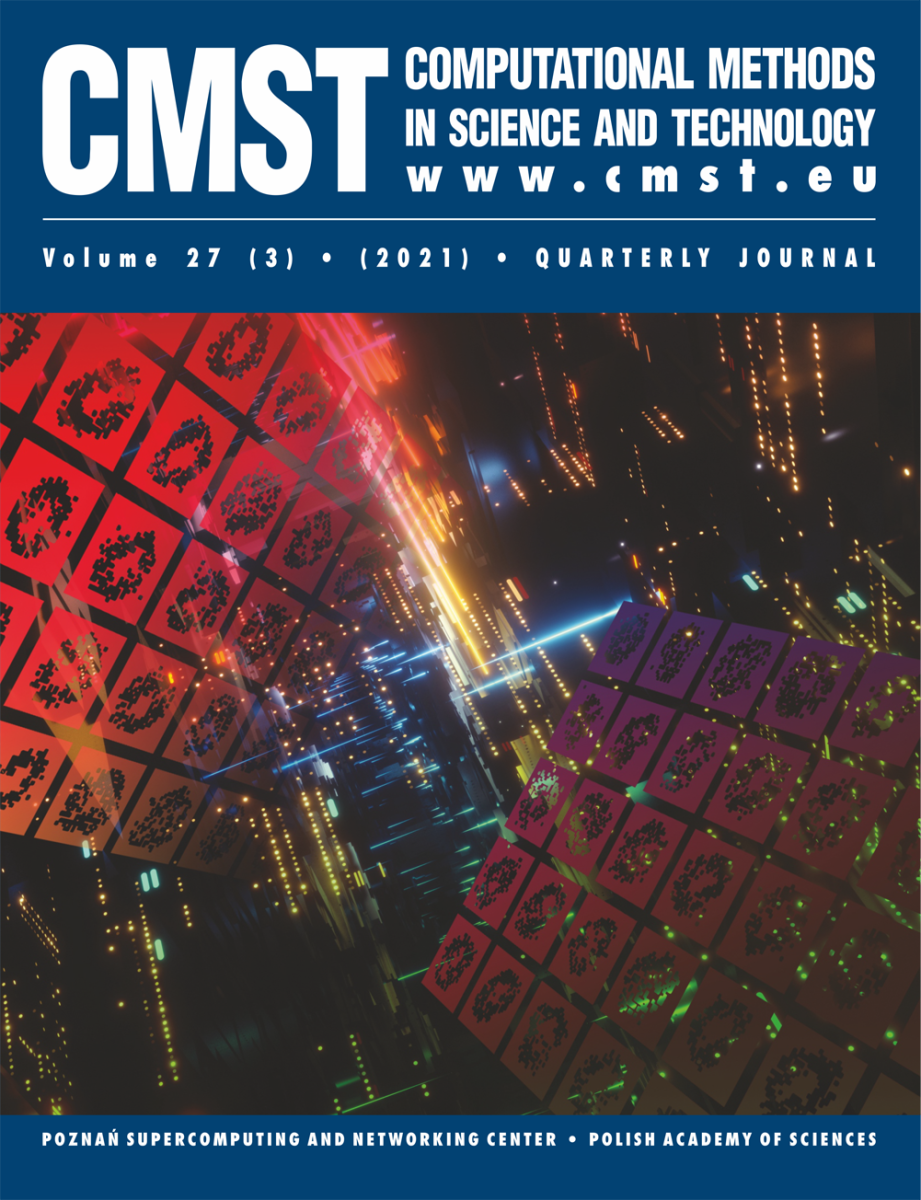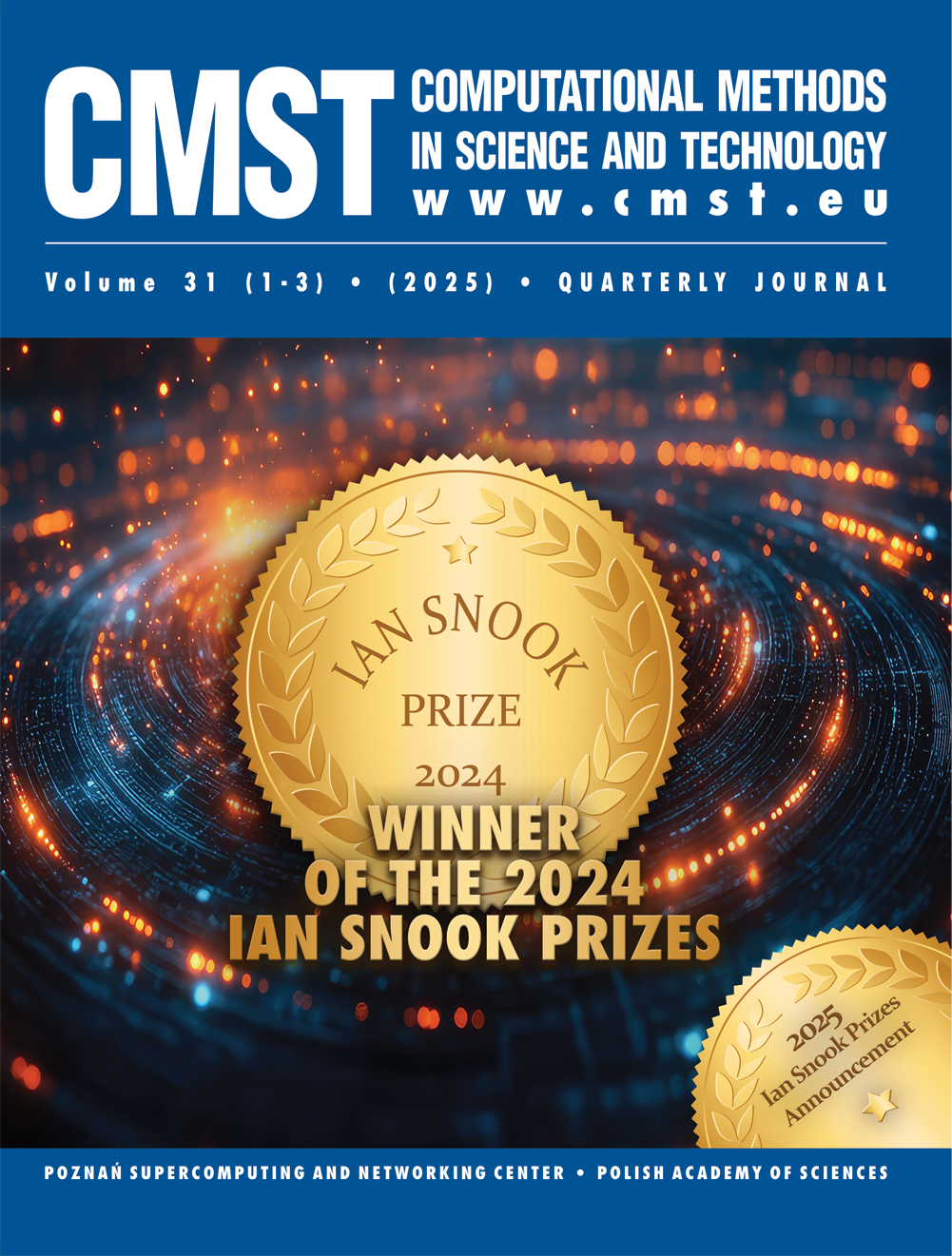Interval Runge-Kutta Methods with Variable Step Sizes
Marciniak A. 1,2, Szyszka Barbara 3
1 Institute of Computing Science Poznan University of Technology
Piotrowo 2, 60-965 Poznan, Poland
E-mail: andrzej.marciniak@put.poznan.pl2 Department of Computer Science State University of Applied Sciences in Kalisz
Poznanska 201-205, 62-800 Kalisz, Poland3 Institute of Mathematics Poznan University of Technology
Piotrowo 3A, 60-965 Poznan, Poland
E-mail: barbara.szyszka@put.poznan.pl
Received:
Received: 25 February 2019; revised: 28 March 2019; accepted: 28 March 2019; published online: 31 March 2019
DOI: 10.12921/cmst.2019.0000006
Abstract:
In a number of our previous papers we have presented interval versions of Runge-Kutta methods (explicit and implicit) in which the step size was constant. Such an approach has required to choose manually the step size in order to ensure an interval enclosure to the solution with the smallest width. In this paper we propose an algorithm for choosing automatically the step size which guarantees the best (i.e., the tiniest) interval enclosure. This step size is determined with machine accuracy.
Key words:
floating-point interval arithmetic, initial value problem, interval Runge-Kutta methods, Runge-Kutta methods, variable step size
References:
[1] Berz, M., Hoffstätter, G.: Computation and Application of Taylor Polynomials with Interval Remainder Bounds. Reliable Computing 4(1), 83–97 (1998)
[2] Berz, M., Makino, K.: Performance of Taylor Model Methods for Validated Integration of ODEs. In: J. Dongarra, K. Madsen, J. Wasniewski (eds.) Applied Parallel Computing. State of the Art in Scientific Computing, Lecture Notes in Computer Science, vol. 3732, pp. 65–73 (2005)
[3] Butcher, J.C.: The Numerical Analysis of Ordinary Differential Equations: Runge-Kutta and General Linear Methods. John Wiley & Sons, Chichester (1987)
[4] Corliss, G.F., Rihm, R.: Validating an A Priori Enclosure Using High-Order Taylor Series. In: Scientific Computing, Computer Arithmetic, and Validated Numerics, pp. 228–238. Akademie Verlag (1996)
[5] Enright,W.H., Pryce, J.D.: Two Fortran Packages for Assessing Initial Value Methods. ACM Transactions on Mathematical Software 13(1), 1–27 (1987)
[6] Gajda, K., Jankowska, M., Marciniak, A., Szyszka, B.: A Survey of Interval Runge-Kutta and Multistep Methods for Solving the Initial Value Problem. In: R. Wyrzykowski, J. Dongarra, K. Karczewski, J. Wasniewski (eds.) Parallel Processing and Applied Mathematics, Lecture Notes in Computer Science, vol. 4967, pp. 1361–1371. Springer-Verlag, Berlin (2007)
[7] Gajda, K., Marciniak, A., Szyszka, B.: Three-and Four-Stage Implicit Interval Methods of Runge-Kutta Type. Computational Methods in Science and Technology 6, 41–59 (2000)
[8] Hairer, E., Norsett, S.P., Wanner, G.: Solving Ordinary Differential Equations I – Nonstiff Problems. Springer–Verlag, Berlin (1987)
[9] Hammer, R., Hocks, M., Kulisch, U., Ratz, D.: Numerical Toolbox for Verified Computing I. Basic Numerical Problems, Theory, Algorithms, and Pascal-XSC Programs. Springer-Verlag, Berlin (1993)
[10] Hansen, E.R.: Topics in Interval Analysis. Oxford University Press, London (1969)
[11] Jackson, K.R., Nedialkov, N.S.: Some Recent Advances in Validated Methods for IVPs for ODEs. Applied Numerical Mathematics 42(1–3), 269–284 (2002)
[12] Jankowska, M., Marciniak, A.: Implicit Interval Methods for Solving the Initial Value Problem. Computational Methods in Science and Technology 8(1), 17–30 (2002)
[13] Jankowska, M., Marciniak, A.: On Explicit Interval Methods of Adams-Bashforth Type. Computational Methods in Science and Technology 8(2), 46–57 (2002)
[14] Jankowska, M., Marciniak, A.: On Two Families of Implicit Interval Methods of Adams-Moulton Type. Computational Methods in Science and Technology 12(2), 109–113 (2006)
[15] Kalmykov, S.A., Shokin, J.I., Juldashev, Z.H.: Solving Ordinary Differential Equations by Interval Methods [in Russian]. Doklady AN SSSR 230(6) (1976)
[16] Marciniak, A.: Implicit Interval Methods for Solving the Initial Value Problem. Numerical Algorithms 37(1–4), 241–251 (2004)
[17] Marciniak, A.: Selected Interval Methods for Solving the Initial Value Problem. Publishing House of Poznan University of Technology, Poznan (2009). http://www.cs.put.poznan.pl/amarciniak/IMforIVPbook/IMforIVP.pdf
[18] Marciniak, A.: Interval Arithmetic Unit (2016). http://www.cs.put.poznan.pl/amarciniak/IAUnits/IntervalArithmetic32and64.pas
[19] Marciniak, A.: Delphi Pascal Programs for Step Size Control in Interval Runge-Kutta Methods (2017). http://www.cs.put.poznan.pl/amarciniak/VSSIRKMExamples
[20] Marciniak, A., Jankowska, M.A.: Interval Versions for Special Kinds of Explicit Linear Multistep Methods (in review, available from the authors)
[21] Marciniak, A., Jankowska, M.A.: Interval Versions of Milne’s Multistep Methods. Numerical Algorithms 79(1), 87–105 (2018)
[22] Marciniak, A., Jankowska, M.A., Hoffmann, T.: On Interval Predictor-Corrector Methods. Numerical Algorithms 77(3), 777–808 (2017)
[23] Marciniak, A., Szyszka, B.: One-and Two-Stage Implicit Interval Methods of Runge-Kutta Type. Computational Methods in Science and Technology 5, 53–65 (1999)
[24] Marciniak, A., Szyszka, B., Hoffmann, T.: An Interval Version of Kuntzmann-Butcher Method for Solving the Initial Value Problem (in review, available from the authors)
[25] Moore, R.E.: Interval Analysis. Prentice-Hall, Englewood Cliffs (1966)
[26] Moore, R.E.: Methods and Applications of Interval Analysis. SIAM Society for Industrial & Applied Mathematics, Philadelphia (1979)
[27] Nedialkov, N.S.: VNODE-LP – a Validated Solver for Initial Value Problems in Ordinary Differential Equations, Tech. Rep. CAS 06-06-NN, Department of Computing and Software, McMaster University, Hamilton (2006)
[28] Nedialkov, N.S., Jackson, K.R., Corliss, G.F.: Validated Solutions of Initial Value Problems for Ordinary Differential Equations. Applied Mathematics and Computation 105(1), 21–68 (1999)
[29] Shokin, Y.I.: Interval Analysis [in Russian]. Nauka, Novosibirsk (1981)
In a number of our previous papers we have presented interval versions of Runge-Kutta methods (explicit and implicit) in which the step size was constant. Such an approach has required to choose manually the step size in order to ensure an interval enclosure to the solution with the smallest width. In this paper we propose an algorithm for choosing automatically the step size which guarantees the best (i.e., the tiniest) interval enclosure. This step size is determined with machine accuracy.
Key words:
floating-point interval arithmetic, initial value problem, interval Runge-Kutta methods, Runge-Kutta methods, variable step size
References:
[1] Berz, M., Hoffstätter, G.: Computation and Application of Taylor Polynomials with Interval Remainder Bounds. Reliable Computing 4(1), 83–97 (1998)
[2] Berz, M., Makino, K.: Performance of Taylor Model Methods for Validated Integration of ODEs. In: J. Dongarra, K. Madsen, J. Wasniewski (eds.) Applied Parallel Computing. State of the Art in Scientific Computing, Lecture Notes in Computer Science, vol. 3732, pp. 65–73 (2005)
[3] Butcher, J.C.: The Numerical Analysis of Ordinary Differential Equations: Runge-Kutta and General Linear Methods. John Wiley & Sons, Chichester (1987)
[4] Corliss, G.F., Rihm, R.: Validating an A Priori Enclosure Using High-Order Taylor Series. In: Scientific Computing, Computer Arithmetic, and Validated Numerics, pp. 228–238. Akademie Verlag (1996)
[5] Enright,W.H., Pryce, J.D.: Two Fortran Packages for Assessing Initial Value Methods. ACM Transactions on Mathematical Software 13(1), 1–27 (1987)
[6] Gajda, K., Jankowska, M., Marciniak, A., Szyszka, B.: A Survey of Interval Runge-Kutta and Multistep Methods for Solving the Initial Value Problem. In: R. Wyrzykowski, J. Dongarra, K. Karczewski, J. Wasniewski (eds.) Parallel Processing and Applied Mathematics, Lecture Notes in Computer Science, vol. 4967, pp. 1361–1371. Springer-Verlag, Berlin (2007)
[7] Gajda, K., Marciniak, A., Szyszka, B.: Three-and Four-Stage Implicit Interval Methods of Runge-Kutta Type. Computational Methods in Science and Technology 6, 41–59 (2000)
[8] Hairer, E., Norsett, S.P., Wanner, G.: Solving Ordinary Differential Equations I – Nonstiff Problems. Springer–Verlag, Berlin (1987)
[9] Hammer, R., Hocks, M., Kulisch, U., Ratz, D.: Numerical Toolbox for Verified Computing I. Basic Numerical Problems, Theory, Algorithms, and Pascal-XSC Programs. Springer-Verlag, Berlin (1993)
[10] Hansen, E.R.: Topics in Interval Analysis. Oxford University Press, London (1969)
[11] Jackson, K.R., Nedialkov, N.S.: Some Recent Advances in Validated Methods for IVPs for ODEs. Applied Numerical Mathematics 42(1–3), 269–284 (2002)
[12] Jankowska, M., Marciniak, A.: Implicit Interval Methods for Solving the Initial Value Problem. Computational Methods in Science and Technology 8(1), 17–30 (2002)
[13] Jankowska, M., Marciniak, A.: On Explicit Interval Methods of Adams-Bashforth Type. Computational Methods in Science and Technology 8(2), 46–57 (2002)
[14] Jankowska, M., Marciniak, A.: On Two Families of Implicit Interval Methods of Adams-Moulton Type. Computational Methods in Science and Technology 12(2), 109–113 (2006)
[15] Kalmykov, S.A., Shokin, J.I., Juldashev, Z.H.: Solving Ordinary Differential Equations by Interval Methods [in Russian]. Doklady AN SSSR 230(6) (1976)
[16] Marciniak, A.: Implicit Interval Methods for Solving the Initial Value Problem. Numerical Algorithms 37(1–4), 241–251 (2004)
[17] Marciniak, A.: Selected Interval Methods for Solving the Initial Value Problem. Publishing House of Poznan University of Technology, Poznan (2009). http://www.cs.put.poznan.pl/amarciniak/IMforIVPbook/IMforIVP.pdf
[18] Marciniak, A.: Interval Arithmetic Unit (2016). http://www.cs.put.poznan.pl/amarciniak/IAUnits/IntervalArithmetic32and64.pas
[19] Marciniak, A.: Delphi Pascal Programs for Step Size Control in Interval Runge-Kutta Methods (2017). http://www.cs.put.poznan.pl/amarciniak/VSSIRKMExamples
[20] Marciniak, A., Jankowska, M.A.: Interval Versions for Special Kinds of Explicit Linear Multistep Methods (in review, available from the authors)
[21] Marciniak, A., Jankowska, M.A.: Interval Versions of Milne’s Multistep Methods. Numerical Algorithms 79(1), 87–105 (2018)
[22] Marciniak, A., Jankowska, M.A., Hoffmann, T.: On Interval Predictor-Corrector Methods. Numerical Algorithms 77(3), 777–808 (2017)
[23] Marciniak, A., Szyszka, B.: One-and Two-Stage Implicit Interval Methods of Runge-Kutta Type. Computational Methods in Science and Technology 5, 53–65 (1999)
[24] Marciniak, A., Szyszka, B., Hoffmann, T.: An Interval Version of Kuntzmann-Butcher Method for Solving the Initial Value Problem (in review, available from the authors)
[25] Moore, R.E.: Interval Analysis. Prentice-Hall, Englewood Cliffs (1966)
[26] Moore, R.E.: Methods and Applications of Interval Analysis. SIAM Society for Industrial & Applied Mathematics, Philadelphia (1979)
[27] Nedialkov, N.S.: VNODE-LP – a Validated Solver for Initial Value Problems in Ordinary Differential Equations, Tech. Rep. CAS 06-06-NN, Department of Computing and Software, McMaster University, Hamilton (2006)
[28] Nedialkov, N.S., Jackson, K.R., Corliss, G.F.: Validated Solutions of Initial Value Problems for Ordinary Differential Equations. Applied Mathematics and Computation 105(1), 21–68 (1999)
[29] Shokin, Y.I.: Interval Analysis [in Russian]. Nauka, Novosibirsk (1981)

